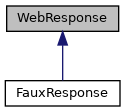Allow programs to request this object from WebRequest::response() and handle all outputting (or lack of outputting) via it. More...

Public Member Functions | |
| clearCookie ( $name, $options=[]) | |
| Unset a browser cookie. More... | |
| getHeader ( $key) | |
| Get a response header. More... | |
| hasCookies () | |
| Checks whether this request is performing cookie operations. More... | |
| header ( $string, $replace=true, $http_response_code=null) | |
| Output an HTTP header, wrapper for PHP's header() More... | |
| headersSent () | |
| Test if headers have been sent. More... | |
| setCookie ( $name, $value, $expire=0, $options=[]) | |
| Set the browser cookie. More... | |
| statusHeader ( $code) | |
| Output an HTTP status code header. More... | |
Static Public Member Functions | |
| static | disableForPostSend () |
| Disable setters for post-send processing. More... | |
Static Protected Attributes | |
| static bool | $disableForPostSend = false |
| Used to disable setters before running jobs post-request (T191537) More... | |
| static array | $setCookies = [] |
| Used to record set cookies, because PHP's setcookie() will happily send an identical Set-Cookie to the client. More... | |
Detailed Description
Allow programs to request this object from WebRequest::response() and handle all outputting (or lack of outputting) via it.
Definition at line 30 of file WebResponse.php.
Member Function Documentation
◆ clearCookie()
| WebResponse::clearCookie | ( | $name, | |
$options = [] |
|||
| ) |
Unset a browser cookie.
This sets the cookie with an empty value and an expiry set to a time in the past, which will cause the browser to remove any cookie with the given name, domain and path from its cookie store. Options other than these (and prefix) have no effect.
- Parameters
-
string $name Cookie name array $options Cookie options, see setCookie()
- Since
- 1.27
Definition at line 257 of file WebResponse.php.
References setCookie().
◆ disableForPostSend()
|
static |
Disable setters for post-send processing.
After this call, self::setCookie(), self::header(), and self::statusHeader() will log a warning and return without setting cookies or headers.
- Since
- 1.32
Definition at line 49 of file WebResponse.php.
Referenced by MediaWiki\doPostOutputShutdown().
◆ getHeader()
| WebResponse::getHeader | ( | $key | ) |
Get a response header.
- Parameters
-
string $key The name of the header to get (case insensitive).
- Returns
- string|null The header value (if set); null otherwise.
- Since
- 1.25
Reimplemented in FauxResponse.
Definition at line 84 of file WebResponse.php.
References $header.
◆ hasCookies()
| WebResponse::hasCookies | ( | ) |
Checks whether this request is performing cookie operations.
- Returns
- bool
- Since
- 1.27
Definition at line 267 of file WebResponse.php.
References $setCookies.
◆ header()
| WebResponse::header | ( | $string, | |
$replace = true, |
|||
$http_response_code = null |
|||
| ) |
Output an HTTP header, wrapper for PHP's header()
- Parameters
-
string $string Header to output bool $replace Replace current similar header null | int $http_response_code Forces the HTTP response code to the specified value.
Reimplemented in FauxResponse.
Definition at line 59 of file WebResponse.php.
References MediaWiki\HeaderCallback\warnIfHeadersSent(), and wfDebugLog().
◆ headersSent()
| WebResponse::headersSent | ( | ) |
Test if headers have been sent.
- Since
- 1.27
- Returns
- bool
Reimplemented in FauxResponse.
Definition at line 116 of file WebResponse.php.
◆ setCookie()
| WebResponse::setCookie | ( | $name, | |
| $value, | |||
$expire = 0, |
|||
$options = [] |
|||
| ) |
Set the browser cookie.
- Parameters
-
string $name The name of the cookie. string $value The value to be stored in the cookie. int | null $expire Unix timestamp (in seconds) when the cookie should expire. - 0 (the default) causes it to expire $wgCookieExpiration seconds from now.
- null causes it to be a session cookie.
array $options Assoc of additional cookie options: - prefix: string, name prefix ($wgCookiePrefix)
- domain: string, cookie domain ($wgCookieDomain)
- path: string, cookie path ($wgCookiePath)
- secure: bool, secure attribute ($wgCookieSecure)
- httpOnly: bool, httpOnly attribute ($wgCookieHttpOnly)
- raw: bool, true to suppress encoding of the value
- sameSite: string|null, SameSite attribute. May be "strict", "lax", "none", or null or "" for no attribute. (default absent)
- sameSiteLegacy: bool|null, If true, SameSite=None cookies will be also be sent as a legacy cookie with an ss0 prefix
- Since
- 1.22 Replaced $prefix, $domain, and $forceSecure with $options
Reimplemented in FauxResponse.
Definition at line 141 of file WebResponse.php.
References $wgCookieDomain, $wgCookieExpiration, $wgCookieHttpOnly, $wgCookiePath, $wgCookiePrefix, $wgCookieSecure, $wgUseSameSiteLegacyCookies, Hooks\run(), and wfDebugLog().
Referenced by clearCookie().
◆ statusHeader()
| WebResponse::statusHeader | ( | $code | ) |
Output an HTTP status code header.
- Since
- 1.26
- Parameters
-
int $code Status code
Reimplemented in FauxResponse.
Definition at line 99 of file WebResponse.php.
References HttpStatus\header(), and wfDebugLog().
Member Data Documentation
◆ $disableForPostSend
|
staticprotected |
Used to disable setters before running jobs post-request (T191537)
Definition at line 38 of file WebResponse.php.
◆ $setCookies
|
staticprotected |
Used to record set cookies, because PHP's setcookie() will happily send an identical Set-Cookie to the client.
Definition at line 35 of file WebResponse.php.
Referenced by hasCookies().
The documentation for this class was generated from the following file:
- includes/WebResponse.php
